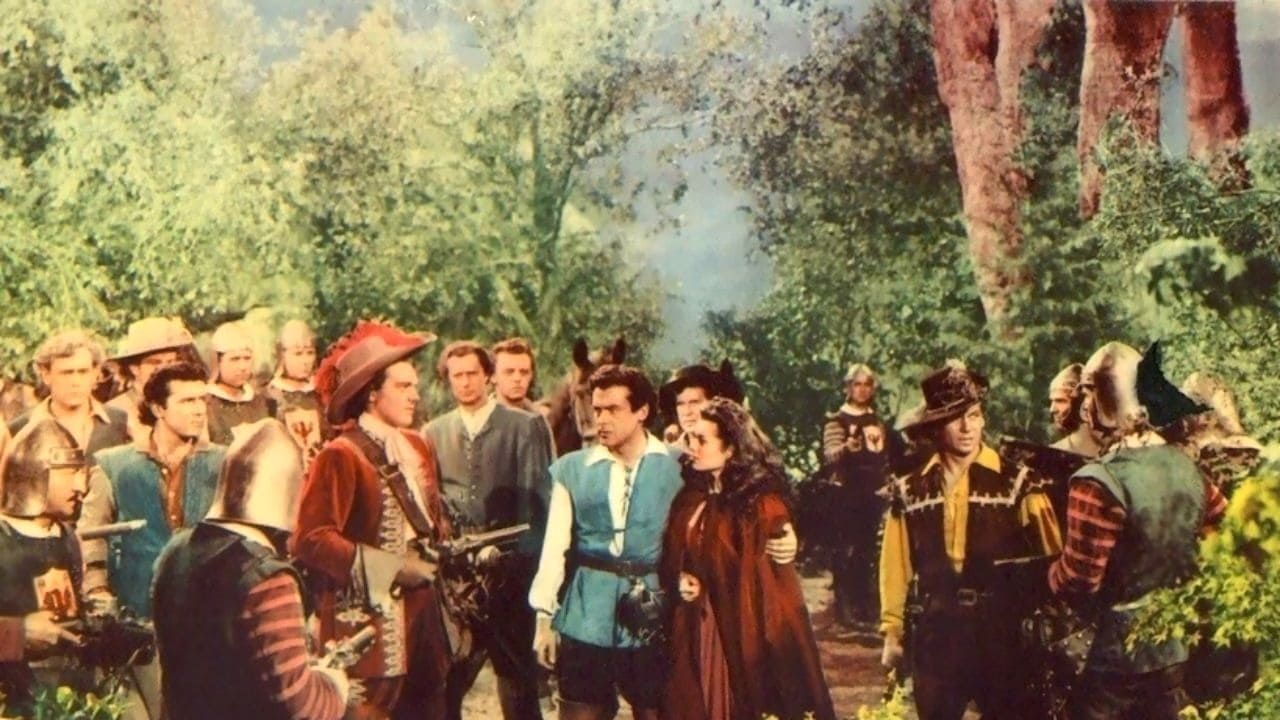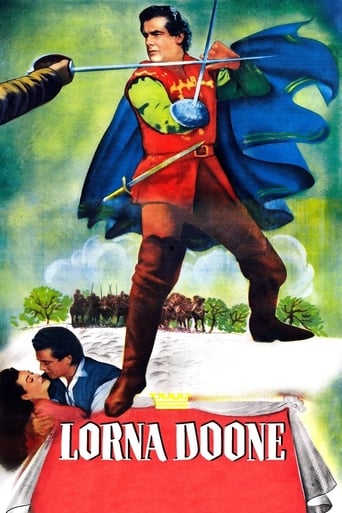

Really Surprised!
... View MoreCharming and brutal
... View MoreThe plot isn't so bad, but the pace of storytelling is too slow which makes people bored. Certain moments are so obvious and unnecessary for the main plot. I would've fast-forwarded those moments if it was an online streaming. The ending looks like implying a sequel, not sure if this movie will get one
... View MoreGreat example of an old-fashioned, pure-at-heart escapist event movie that doesn't pretend to be anything that it's not and has boat loads of fun being its own ludicrous self.
... View MoreMy main trepidation when tuning in to this costumer was that there would be California accents ringing all around Richard Greene and Merrie England...but no! Everyone from lovely Barbara Hale to the slew of Hollywood western veterans that surround her (including Ray Teal, Harry Lauter, and the always excellent Myron Healy) all come up with admirable mid-Atlantic intonations. Yes, the plot is old as the hills, and the production values are B+ rather than A. But the technicolor is great, and the drama and thrills are definitely there. This overlooked movie is pure comfort viewing for anyone who enjoys ridiculous historical adventures from 1950s Hollywood. Loved it.
... View MoreOne of a number of film adaptations of the long 1869 novel of the same name by Richard Blackmore. Technicolor released by Columbia in 1951,it stars Barbara Hale as Lorna Doone, and Richard Greene as the rebellious commoner John Ridd. It takes place during the latter part of the reign of Charles II, in the 1670s and '80s, in the wild country of Exmoors, in the southwest of England (not in Scotland, as stated in the summary at this site!) The Doones, as the traditional overlords in one part of the Exmoors, had been recently stripped of their feudal lands and rights ,due to political conflict with the crown. Nonetheless, they continued to live in their castle, on a hilltop, and continued to demand confiscation of the crops and animals of the now free farmers. Thus, they were technically a gang of thieves. The farmers also now had to pay a tax to the crown, since the crown technically owned the land. Thus, both the farmers and the crown are at odds with the Doones. But, the crown is not disposed to send a military force to enforce its edict, and the farmers have no swords or firearms with which to fend off the parasitic Doones. Their extreme alternative threat is to fail to plant crops or burn their crops, or kill all their animals. After seeing the film, it takes little imagination to see the many similarities with Warner's 1938 "The Adventures of Robin Hood". When in rebellion, the farmers usually take to the woods,as did Robin's men. The Doones can be seen as the equivalent of Prince John and his cronies. The local sheriff is working for the bad guys in each case. King Charles and his supporters, then, are the equivalent of King Richard. There is the obligatory rapier duel between the hero and the main bad guy at the end. There is a love story between the hero and a girl of the opposition in both cases, threatened by an obligation to marry one of the nobles. In this film, the contested girl is Lorna Doone, and the chief villains are Carver and Charlesworth Doone, who are essentially the same age as the hero, John. Sir Ensor Doone, the patriarch of the clan, is not quite as rapacious as his sons. Unfortunately, he dies, unleashing further terrorizing by his sons.It's not until Charles and his ally, the Duke of Lorne, arrive with troops to abet the schemes of the farmers that the Doones are finally crushed. Although the ending is provisionally happy, it's best said to be guardedly hopeful. See the film to find out what I mean. It's currently available on YouTube. The main adult actors were fine, except Barbara Hale wasn't the most charismatic "princess". The child actors were a bit stiff. Overall, it's not a bad film. However, "The Adventures of Robin Hood" is certainly more fun, with occasional humor to balance the tense moments, and the personality of Errol Flynn.Other, more recent film versions made for TV, were released in 1990 and 2000. The latter has a significantly higher rating, but is more than twice as long as the present film,at 3 hours. I haven't seen either.
... View MoreThis Hollywood rendition of the British literary classic by R.D. Blackmore was dubbed "grotesque" by the late, eminent but notoriously conservative film critic Leslie Halliwell where, he opined, the narrative was treated "as if it were a Western"! Such a damning assessment did not augur well, to be sure – but, then, Leonard Maltin rated it higher than the director's best-regarded costumer i.e. the just-watched THE BRIGAND (1952). The truth, as often happens, lies somewhere in between: while the plot does feel like a typical 'terrorized homestead' scenario, it is nevertheless engaging (indeed, more so than the better-received 1934 version that had preceded this viewing!) and, to its credit, looks veritably gorgeous in the Technicolor print shown on Australian HD-TV I acquired (despite the "Back Soon" and "Now" announcements signalling frequent commercial breaks!). Still, it does not quite have the impetus to rise above the clichés – lacking the wit and verve that would characterize THE BRIGAND and substituting glumness, ill-matched stars (Barbara Hale and Richard Greene) and a decidedly anodyne villain (William Bishop)!While the essence of the tale, at least as shown in the earlier adaptation, is there, a number of crucial differences are also on hand – which, again, can either work in its favour or against: first of all, the Doones (headed by siblings Carl Benton Reid and Onslow Stevens) reside in a castle and, rather than mere bandits, are overlords enslaving the people a' la Prince John in the Robin Hood legends; the male protagonist here is a soldier in King Charles II (not James!)'s army, so that the opposition he offers involves military tactics (a planned sneak attack by way of the waterfall which had introduced the hero to Lorna as kids) instead of just an impulsive personal vendetta; the character of Tom Faggus (played this time around by Ron Randell) is much more important here but, then, his romance with Greene's barely- registering sister feels contrived; a number of violent scenes (floggings, hangings) are incorporated, culminating in full-blown swashbuckling action at the climax; there is not one but two interrupted wedding ceremonies (in both of which Lorna is the prospective bride!), with the last semi-tragic one preceding the inevitable showdown between her two contenders – which, however, ends with the predictable fall from a great height and not a marshland drowning; Lorna's background (a spiteful kidnapping stunting her regal birthright), on the other hand, is more than adequately dealt with since the King himself comes into play on a couple of occasions! With this, I am now left with the Silent 1922 filmization by Maurice Tourneur to check out – while marking the start of a three-movie mini-marathon dedicated to Greene as part of my current Epic Easter viewings.
... View MoreI say it's a great story, but like so many great stories (Lord of the Rings, for example) it would never get published today. In truth; it's the plot that's really great: Blackmore's telling of it is the the most long-winded lump of verbosity I've ever encountered.Cut to the chase. Here we have the story told in a fairly minimalist though typical way of the time. It would run for at least another 30 minutes if brought to the big screen today. British telly-hunk Richard Greene plays the spirited yeoman John Ridd besotted by his darling Lorna. Unfortunately, She is of the dreaded Doone clan, a hell-raising ruthless family who have used their position of landed status to impose a reign of terror on the countryside that is their titled dominion.A juvenile Ridd first encounters his girlish desire after scaling the supposedly unclimbable waterfall to the Doone lair. It is love at first sight. A young man about his own age, aptly called Carver, and destined to be heir to the Doone estate has similar sexual ambitions, and you can see what's coming. The Doone fortress is practically unassailable. But there's an Achille's heel: the waterfall...I saw this movie ages ago when I was a kid and enjoyed it immensely. A particular exchange stuck in my memory. Young Ridd is discovered where he shouldn't be by the Doone clan and threatened by Carver. But the old patriarch restrains his impetuous heir-apparent and invites Ridd to visit them by more conventional means. It goes something like this:Patriarch:'You must come back and see us when you are tall enough to cast a shadow on our door.' Carver: 'Aye; come back then and cast your shadow if you dare.' Ridd: That I shall, Carver, And I hope you're standing before me.'That's not word-perfect, but it was good, portentous stuff like it. If the rest of the script was no worse, I think it would still be fun.Another commentator has posted a rather disappointing critique and his memory may be better (or fresher) than mine. But if it was no worse that ITV's similarly-vintaged 'Adventures of Robin Hood' also starring Mr Greene then I'd still be willing to give it a go. After all; you can't blame the actors if the sword-fighting was poorly choreographed.Any who visit 'Doone Valley' in the south-west of England will find the landscape far less dramatic than depicted in story or movie.
... View More